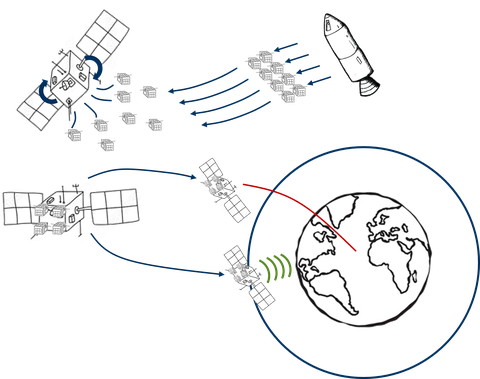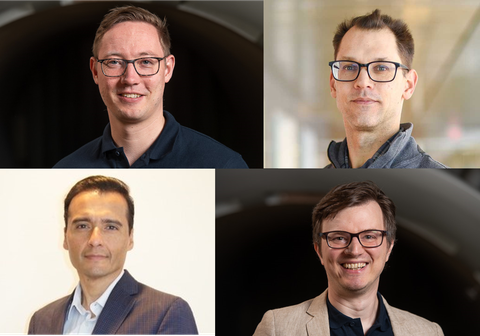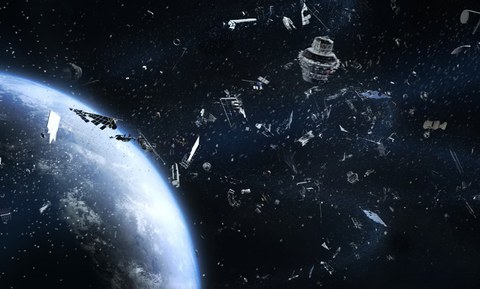Jul 15, 2024
Launch of the REDECORATE project to combat space debris
Space industry is growing at an unprecedented rate with more satellites launched into low earth orbits (LEO) each year than ever before. This is leading to an increasing number of collisions of uncontrolled space objects and space debris accumulation in LEO. European Space Agency’s (ESA) 2022 Space Environment Report estimates a total of 30,000 larger pieces which are catalogized and regularly tracked (e.g., rocket bodies and de-commissioned satellites). Counting any object larger than 1 cm, the number is likely over one million. Every single piece of debris is a potential lethal threat to active missions and astronauts. Space debris presents one of the biggest challenges to space economy. Sustainability of the space economy requires new techniques to address space debris.

Concept of the mission
On the 1st of July, the European Commission funded MSCA Postdoctoral Fellowship (Type Global) REDECORATE – REcommissioning and DEorbiting using Cubesat swarms with electrO spRAy ThrustErs started at Prof. Pfifer’s Chair of Flight Mechanics and Control. During the next 3 years, our Marie-Curie-Fellow Dr. Felix Biertümpfel will cooperate with the international experts Prof. Paulo Lozano at the Massachusetts Institute of Technology (MIT) and Prof. Peter Seiler at the University of Michigan (U-M). Together they will work on novel concepts to proactively prevent the generation of space debris.
REDECORATE proposes CubeSat swarms as a cost-effective way to mitigate space debris. It develops a debris deorbiting and recommissioning concept for decommissioned satellites. The concept combines novel control and guidance approaches with a CubeSat swarm using ionic electro spray engines (iESE).
In principle, a CubeSat swarm can rendezvous with space debris, dissipate its rotational energy (detumble) using, for example, its reaction wheels. The CubeSats’ main thrusters then lower the debris orbit to burn-up the system in the atmosphere. Such a mission is highly challenging, requires coordinated CubeSat swarm guidance and control, reliable hardware and effective propulsion - a combination which does not exist so far. REDECORATE addresses three crucial problems of such a mission.
First, iESE thrusters are proposed to overcome the limitations of current CubeSat propulsion and attitude control. Electrospray engines are passively fed, compact, fuel-efficient, and can be used for both main propulsion, and attitude and position control. Due to their small form factor, multiple stages of iESE can be installed on a CubeSat and then be sequentially used. Staging achieves longer missions, higher reliability, and thrust than standard CubeSat propulsion. Moreover, iESEs are completely throttleable and jitter-free. Hence, using electrospray thrusters for attitude and position control facilitates new levels of CubeSat control performance. If the CubeSats are attached around a decommissioned satellite, coordinated activation of the iESEs can function as a new control system for detumbling (avoiding unreliable reaction wheels) and deorbiting. Due to their long life-time, the swarm can also be used to recommission the satellite if, e.g., a failure in the satellites flight control system, caused a premature end of its mission. Second, a safe-by-design hierarchical control framework will be developed to address the need for high reliability. It uses a planner-tracker feedback stack and addresses all mission segments. Third, integral quadratic constraints (IQCs) will be used to increase robustness w.r.t. system uncertainties and communication delays inside the swarm. The feasibility of the control concept will be validated using IQC-based and probabilistic robustness analyses on a digital twin of the iESE CubeSat swarm and microcontrollers-in-the-loop.

From top left to bottom right: Felix Biertümpfel, Peter Seiler, Paulo Lozano, Harald Pfifer
The project will commence with a 2.5 month stay at the Chair of Flight Mechanics and Control during which the mission and the CubeSat swarm will be modelled. Afterwards, Dr. Biertümpfel will MIT’s Space Propulsion Laboratory for a 1.5-month secondment. Together with Prof. Lozano, Dr. Biertümpfel will gain expertise in iESE CubeSats and design and validate a robust attitude control design for a single iESE CubeSat. Afterwards, our Fellow will join Prof. Seiler at the University of Michigan for 20 months to develop advanced control algorithms for CubeSat swarm debris missions. In his 12-month return phase at the Chair of Flight Mechanics and Control, Dr. Biertümpfel will validate the control designs benefiting from Prof. Harald Pfifer’s background in the analysis of complex space systems.
Contact:
Dr. Felix Biertümpfel
TU Dresden
Tel.: 0351 463-38197


